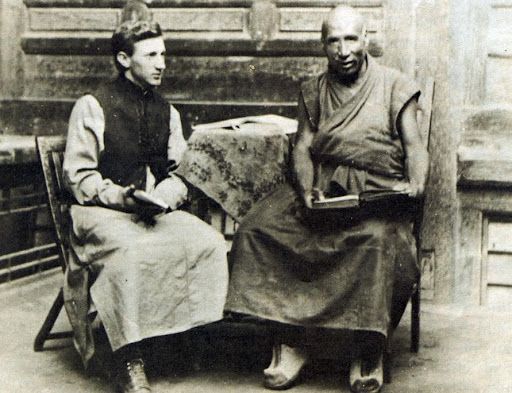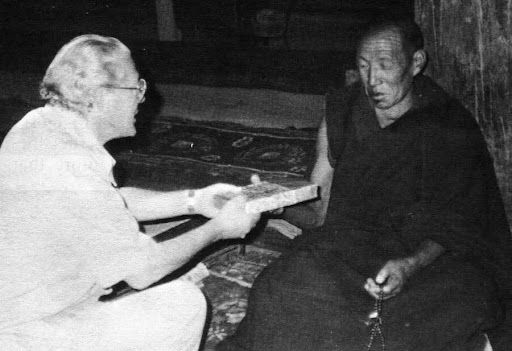1980s
Amdo ཨ་མདོ་
A well-known house church leader from Henan Province, Peter Xu Yongze, told the author how his church movement's work started among the Amdo Tibetans:
"Our first workers arrived in Qinghai in 1985. They were two young women who had not been through any of our training schools, but they had a passion to serve the Lord and a burden for souls. The following year we sent some more workers to join them at Golmud.
By the grace of God, over time a foundation was laid, and we had Christian families living at every train stop between Xining and Golmud. Our workers actively shared the gospel with Tibetans everywhere. It was not an easy ministry, but after years of consistent witness we saw the walls between the Tibetans and the Han slowly come down. The Tibetans were more receptive to the gospel, although only a few became steadfast believers in Christ."
The house church workers in Qinghai faced many personal difficulties, and often went hungry for extended periods. Xu recalled:
"I remember one young sister had no money or food, so she went to the train station and collected small pieces of coal that had fallen from the steam trains. She then tried to sell the coal for a few pennies, just so she could survive. This was the kind of commitment our workers in Qinghai displayed.
Another team ran out of money and food while they were preaching the gospel. They stood in the desert and prayed for Gods help, and then moments later they noticed wild onions growing out of the barren soil. They gathered them up and ate them. New onions continued to appear every day while they had no option but to depend on God for their survival. After a while a small fellowship was established. Those believers took the responsibility to house and feed the evangelists, and from that day forth the onions no longer appeared!
Ministry in Qinghai has many challenges. In winter, temperatures can drop to minus 20 degrees Celsius or colder. The people are very poor, and most have never previously heard of Jesus. Many times our workers have been beaten by locals or chased by the police. Through many difficulties, our workers have persevered and now a steady flow of people are being saved into God's kingdom."
As the number of Christians living among the Tibetans increased, their influence spread, and the Word of God was accompanied by signs and wonders which broke down walls of unbelief and sin. Whereas in the past only a few individual Tibetans had come to Christ, now groups of Tibetans were being confronted by the reality and power of the gospel.
In 1985, a dramatic letter was received from a woman in Qinghai. It told of her journey from despair, descent into demonization, and ultimately her deliverance:
"I am 45-years-old, and the mother of four sons. When I was about to have my fourth child, I burnt incense and prayed to Buddha, as I wanted a daughter who could be close to me and look after me....
When my fourth child turned out to be another boy, I was very angry that my prayers had not been answered by Buddha. I felt tricked, and lost all self-control. When the baby was born I put him on the ground and refused to wrap him up, leaving him to freeze to death. My husband came and took care of him, and he gradually grew bigger....
The devil really took me over. Every day I wanted to die, and I didn't want to see my children or husband. I tried to hang myself but was discovered just in time by our neighbors.... I became just like a madwoman. My husband took me to see many doctors, but all to no avail. He even sought help from the idols but it was no use—my madness went from bad to worse.... I was tormented for six years.
Some Christians urged my husband to trust in Jesus, but he paid no attention. Then one day, a Christian in our village came and said, 'There's a meeting underway in a brother's house near here. Go quickly!'
With no other hope, my husband balanced me on a bicycle, and with my sons' help I was wheeled to the meeting. Just before we went inside,, I spotted a well nearby and attempted to throw myself in, screaming, 'I can't bear any more!' The Christians were having Sunday worship, but when they heard me they all united in prayer and called on the Lord's Name to drive out the demon.
It was amazing! From that instant until the present time I have not been ill. I know that when they prayed, the devil was immediately cast out. A great weight lifted from me, and my nerves calmed down. From that moment I have never missed a meeting. My home is now full of joy as Jesus is the Head of our household."
In 1987, another report told of a remarkable breakthrough among the Amdo in Gansu Province:
"During the joyous New Year's celebrations a number of Christian households joined together for worship. Suddenly a group of Tibetans appeared and told the Christians that they were to stop meeting together as it was not pleasing to their god....
When they refused to disperse, the Tibetans began to physically attack them. They knocked them to the ground and beat some of them severely. The Christians did not retaliate.
The next morning the Tibetans found their sheep, cows and horses were sick and dying. These were their most precious possessions, and for many of them their livelihood. What was worse, some of their family members became violently ill and appeared to be near death.
It did not take long for the Tibetans to equate their sudden illnesses to their attack on the Christians. A delegation was sent to the Christians' homes, and with tears in their eyes they begged for forgiveness and asked the Christians to pray that God might lift the curse. The believers agreed to pray for the sick and dying, and they were made well.
More than 100 Tibetans in that village became Christians. Theirs had been a confrontation with a more powerful God than their own."
Foreign Christians also began to revisit the Tibetan border areas during the 1980s. In some cases, missionary children who had grown up in Tibet returned to their old homes to see if any fruit remained from their family's labors.
In 1908, Ivan Kauffman had arrived in Tibet as a missionary with the Christian and Missionary Alliance. On the long sea voyage he had shared his cabin with Victor Plymire, who went on to have a long and distinguished career among the Tibetan people.
Now, eight decades later, Kauffman's son Paul had founded a mission organization called Asian Outreach, which was active until the early part of the 21st century. In the late 1980s he returned to the Amdo region where he had spent part of his childhood, and shared the Good News of Jesus Christ with as many people as possible.
© This article is an extract from Paul Hattaway's book ‘Tibet: The Roof of the World’. You can order this or any of The China Chronicles books and e-books from our online bookstore.
1. China's Millions (January 1877), p. 5.
2. A. J. Broomhall, Hudson Taylor & China's Open Century: Book Six – Assault on the Nine (London: Overseas Missionary Fellowship, 1988), p. 148.
3. "Through Eastern Thibet," China's Millions (August 1879), p. 101.
4. My translation of the Jean-Baptiste Brieux Obituary in the Archives des Missions Etrangères de Paris, China Biographies and Obituaries, 1800-1899.
5. "What it Costs to Murder in Tibet," Chinese Recorder (August 1891), pp. 358-59.







